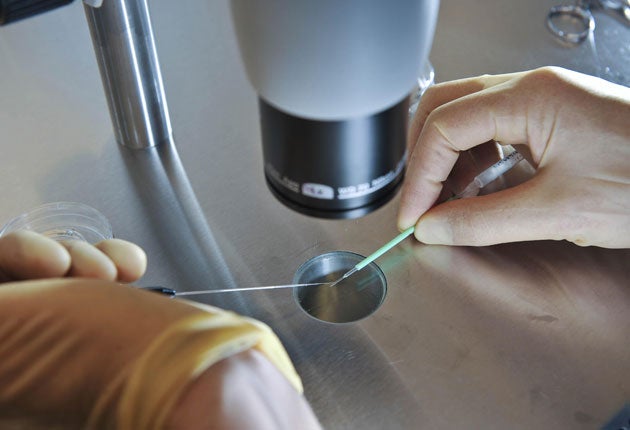‘People were extremely stressed and anxious’: IVF treatment through NHS plummets by 7% in pandemic
‘Fertility sadly declines with age. Any delay can be devastating and have an impact on whether someone has successful treatment,’ says expert

Women going through IVF became “highly anxious” after clinics closed in Spring 2020 due to Covid, while IVF funded by the NHS plummeted by 7 per cent during the pandemic, according to new research.
A report by the Human Fertilisation & Embryology Authority, the fertility watchdog, noted the majority of fertility treatments were temporarily halted in mid-April 2020 alongside other elective medical treatments.
This was a direct consequence of healthcare professionals scaling back face-to-face appointments due to nationwide efforts to curtail the spread of Covid, coupled with the fact NHS staff were redeployed to help fight on the frontlines of the coronavirus crisis.
Researchers at the watchdog noted the UK fertility sector was able to open back up again after just a few weeks with the help of their recommendations and support.
The study found in the first week fertility clinics could apply to open their doors again, around eight in 10 private clinics and around three in 10 NHS clinics had been granted the green light to reopen. But by October 202, the proportion had surged to 97 per cent of private clinics and 95 per cent of NHS clinics.
Clare Ettinghausen, of the Human Fertilisation & Embryology Authority, told The Independent: “The success of IVF is often related to the age you have it, and fertility sadly declines with age. Any delay can be devastating and have an impact on whether someone has successful treatment.”
She noted the “uncertainty” caused by IVF clinic closures in the wake of the pandemic caused a great deal of “stress and fear for many patients and their partners” because they had no idea when their treatment would resume.
Ms Ettinghausen added: “We had many, many patients who were very concerned about whether they would be able to have treatment.
“They were worried whether NHS funding which is age dependent would run out while clinics were closed. As much as we tried to give patients information, in the first lockdown, we didn’t know how long it would take before clinics would reopen.”
She noted in some areas women cannot access IVF via the NHS once they are older than 38, while in other places in England, they can get treatment until they are 40.
Ms Ettinghausen said: “People were extremely stressed and anxious when clinics would reopen. People were angry. It was a very difficult time for them because of the uncertainty.”
Across the UK nearly 70 per cent of fertility treatment is conducted privately and paid for by patients themselves, she added, explaining private clinics could reopen quicker as they did not have members of staff or equipment redeployed to other parts of healthcare services.
Ms Ettinghausen said it was surprising IVF treatment did not decline more sharply during the pandemic - adding that it was the first elective service to reopen during the public health crisis.
“The IVF process involves other women’s health or gynaecological appointments before fertility treatment can start,” she added. “There we have seen the legacy of Covid as waiting lists have really grown. This may have an impact on IVF on an ongoing basis.”
The report noted there was a 38 per cent fall in the number of NHS-funded IVF cycles for patients aged between 18 and 34 from 2019 to 2020, in comparison to a 13 per cent decrease for patients of the same age who are privately funded.
Researchers argued the report’s findings showed fewer patients grappled with delays on IVF during the Covid crisis than they had previously worried may have been the case.
Julia Chain, chair of the fertility watchdog, said: “Understandably, many patients wanted to begin or continue fertility treatment during the pandemic and clinic staff went above and beyond to offer safe care.
“However, Covid-19 related measures did have an impact on some patients, as many appointments had to be provided remotely and those that were in person, were restricted in attendance to just the patient.”
Jason Kasraie, a consultant embryologist at the Shropshire and Mid-Wales Fertility Centre, said: “The initial closure of clinics was an incredibly stressful event for many couples, as every month of delay could reduce their chances of starting a family.
“Whilst we had to make some difficult choices, like asking couples to isolate and test during their treatments and to attend appointments as individuals when normally both partners would be present, clinic staff worked incredibly hard to mitigate these issues and offer additional support.”
Join our commenting forum
Join thought-provoking conversations, follow other Independent readers and see their replies
Comments


Bookmark popover
Removed from bookmarks